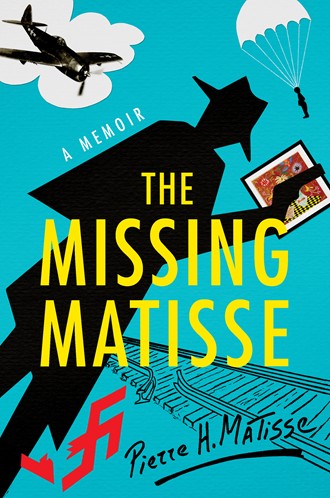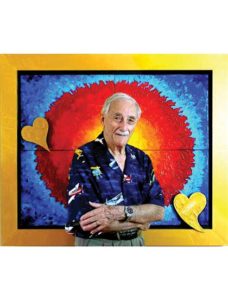Even as one who knows little about art and art history, the name “Matisse” means something to me, and this memoir from the grandson of Henri Matisse is a fascinating account of life in France before and during World War 2. That the author has a famous family and is an accomplished artist in his own right is a bonus.
 The Missing Matisse by Pierre H. Matisse gives us a glimpse of the early 20th century art world and war from the perspective of living in an occupied country. Pierre occasionally meets his grandfather’s artist friends like Pablo Picasso and Salvador Dali.
The Missing Matisse by Pierre H. Matisse gives us a glimpse of the early 20th century art world and war from the perspective of living in an occupied country. Pierre occasionally meets his grandfather’s artist friends like Pablo Picasso and Salvador Dali.
Most of the book centers on the war years, and it’s a fascinating recollection of the adventures of a boy who often finds himself involved in resistance activities. It reads like a story your grandfather would tell you about his life.
If you’re art lover or a World War 2 buff or a fan of interesting life stories, put The Missing Matisse on your to-read list.
(Disclaimer: I received a free copy of the book through the Tyndale Blog Network. Review reflects my opinion.)
If you’d like to know more about the author, read on for a Q&A provided by Tyndale House Publishers.
Pierre Henri Matisse was born in Paris in 1928. Brought up as the grandson of Henri Matisse, Pierre spent his childhood among some of the most famous artists of the century, including Pablo Picasso and Salvador Dali. During WWII, Pierre and his father, Jean Matisse, were heavily involved in French underground activities, wanted by the Nazis for their efforts in aiding the British spies and saboteurs. When the war ended, Pierre worked in the restoration of the art and historical monuments damaged by the war in France. Now a citizen of the United States, he is an artist who has given or created commissioned pieces to help organizations such as Project Hope, The American Red Cross, numerous children’s hospitals, and many others.
What prompted you to write this book at this time in your life?
My parents did not tell me much about their lives. I want my children to know about mine.
What is your hope for this book?
I love books, and I have loved to read all my life. Books are where I learned what I know – from other people’s life experiences. In hard times books have been my best friends, my source of inspiration. I want my book to be an inspiration, a story about survival no matter what, showing how I relied on courage, faith, hope and love.
Tell us about spending with your grandfather, Henri Matisse. Did you know then that he was a famous artist?
I did not spend much time with him, because he was immersed in his art and living in Nice on the French Riviera, while I was living in Paris. As a child, I had no idea my grandfather was famous until the day he came to visit us in Paris and took me to a jazz concert starring Django Reinhardt. I love music, especially jazz. After the concert Grandfather Matisse told me that Django was one of his friends, and asked me if I wanted to meet him. I answered with an enthusiastic ‘yes’! From that day on, I knew that my grandfather Henri had to be very famous if he could access famous people and call them his friend.
You are an artist in your own right, can you tell us about the color lesson you received from your grandfather, Henri Matisse, when you were young?
My mother who graduated from the prestigious Beaux Arts art school in Paris, had tried to teach me everything about colors to no avail. I could not figure out her complicated color theory. So when we visited Nice during the summer of 1939, she arranged a color lesson for me with Grandfather Matisse. My idea about colors was that the more color tubes an artist owns the more fabulous a painter he is. So I came to my grandfather with a big box full of color tubes I had purchased with my own money that I had saved. Obviously I was going to impress him with my color arsenal. I had even memorized the fancy names so I could speak color jargon like a pro. Grandfather welcomed me into his studio with a charcoal in his hand and asked me to put my big box on a table. He foraged through the box taking out tubes of vermillion, ultramarine blue, yellow, and white. As he handed me these four colors, he said “From now on, paint with these four colors – rouge, bleu, jaune, et blanc. I am confiscating this box and forbid you to buy any other colors than these four. Now go and paint. Convey my love to your mother and father.” End of the color lesson. On my way back, I thought that Grandfather was losing it. How could a talented artist like me possibly turn out masterpieces with these ridiculous four colors? After I reflected, I decided to give it a try to prove to him that I could paint good stuff no matter what. Well, my painting skills improved drastically. Grandfather Matisse used to say, “I paint with simple colors.” To this day, I follow his advice.
Can you talk about your memories of WWII and the time you spent with your father, Jean Matisse, in the French Underground?
My father was involved with British intelligence, assisting British spies. On more than one occasion, we set out in a small boat and rendezvoused with a British submarine off Cap d’ Antibes on the French Riviera. We brought British spies ashore and hid them in our home. During the winter of 1943, I was an apprentice illustrator at a print shop. On the side, I helped a secret printing business and made false papers, passes, and fake IDs. On D-Day, I was living in Normandy and when the Nazis began to be pushed back to the Allies, I had encounters with them that should have gotten me killed. It is a miracle that we all survived the war.
When you were twelve-years-old, your mother said you needed to stop answering to the name Matisse and to go by the name Leroy instead. Then she sent you away to boarding school. Can you discuss the impact that had on you? Did you feel abandoned?
First, I did not blame my mother or anybody else. It was war time, and war was being fought in our backyard. My parents had a delicate problem to navigate and they did the best they could under the circumstances. As for me, I was devastated when it happened. Because I had always been an adventurous boy who was often getting into trouble, I thought that I had been kicked out of the family for bad conduct. First, I cried. Then I pulled myself together and asked God for courage. From that day on, I felt I was a real man, on my own. I knew I would have to figure out life by myself.
When and why did you legally change your name back to Matisse?
I did not change my name – I reclaimed the name I had been known by until I was twelve years old. In 1966, with my wife, Jeanne’s encouragement, I began pursuing the documents I needed to reclaim my name. Official French school documents from1939 verified that my name is Renee Pierre Louis Henri Matisse. The paperwork was presented to legal authorities in France, Canada, and the United States, and accepted.
Why are you questioning who your father is? Who do you believe is your real father?
My mother told me when I was twelve years old that my last name is Leroy. Later, my grandmother Leroy tells me that I am not her grandson; I am a Matisse. At the end of the war, the man who is supposedly my father – Camille Leroy – confirms what his mother had told me. “You are not my son” he tells me. What would you do? So who is my father? I want to know…and DNA will reveal the answer.
Why do you think your mother was abandoned by the Matisse family at the time of her death?
The facts were that my mother, after twenty years of marriage to Jean Matisse, had left him just months before she died. The Matisse family was rich and when any of them were ill, they were treated at the American Hospital, the best hospital in Paris at the time. My mother was not sent there. She died in a common room with no privacy, in the most abject conditions. She was screaming in agony from unbearable pain. I loved my mother dearly and am thankful I was able to be with her in her dying moments. As for the Matisse family’s decision to abandon her, how do you think I feel about that?
You were recently baptized in a bathtub by Willie Robertson of Duck Dynasty fame. How did you meet him, and what prompted you to become baptized later in life?
My wife, Jeanne, and I became friends with the Robertson’s after Jeanne became seriously ill. Their television show made us laugh and we watched it during her recuperation. Eventually, our families connected and I was invited to give an art lesson on a Duck Dynasty episode. While Jeanne and I were in Louisiana, we had dinner at Willie and Korie’s home, and out of the blue, Willie asked me if I had been baptized. I told him I was not sure. Willie offered to baptize me for real – right then and there – in his bath tub. I agreed and had a redneck baptism. It has made a significant difference in my relationship with God and my life in general.
What has your faith taught you about forgiveness and starting over?
Resentment, holding grudges, hate, are negative feelings, and guilt for past mistakes that you can do nothing about will destroy and poison your soul. I am a positive person who is a problem solver. I believe in finding the good in everything and focusing on it. Many times, I was forced to think of alternative solutions to stay alive in the situation I was in. In those difficult circumstances, it was time to pray for courage.
Tell us about your other interests as a pilot, a photographer, music lover, art history buff etc.
Sailing a boat, flying a small plane, photography, music, and literature, actually, all of life is about creating and the word art describes both the process and the end product. History and art history are linked together, they are a blueprint to our precious heritage as they define who we are as descendants of the true Creator. I belong to the same kind of spirited men who painted masterpieces on cave walls thousands of years ago.

